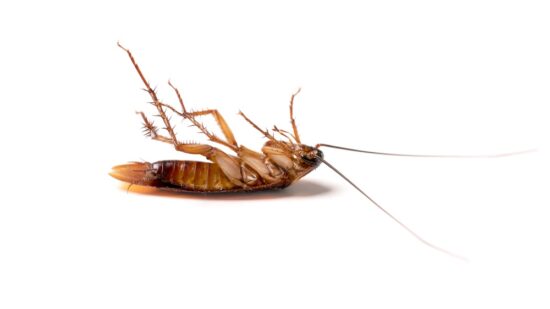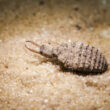Figuring out what cockroaches hate has taken a lot of trial and error over the years. Thankfully, the list is pretty well-established at this point!
Below you’ll find all of the various smells, scents, and items that roaches hate. It’s shocking how well some of them work!
Table of contents
1. Citrus
Many people love the scent of citrus for its clean, comforting and revitalizing properties. However, cockroaches hate this smell. Not only do they not share this same appreciation for citrusy smells, and they will often avoid any areas where they would come in contact with them.
If you are dealing with a cockroach issue in your home, then you can use a cockroach’s hatred of citrus smells to your advantage. Not only will using citrus-based products help to repel cockroaches, but it can also help your home smell clean and fresh.
There are many ways to use the scent of citrus to keep unwanted roaches away. You can try using a lemon scented floor cleaner or kitchen cleaner. This method smells nice at first, but it may not be the most effective since the scent in these cleaners tends to diminish quite quickly.
You can also make a do-it-yourself deterrent spray by squeezing some lemon juice into a spray bottle that’s filled with water. Use this all-natural spray to treat any areas where you have seen cockroach activity. Oranges and limes can be used instead of lemons in this spray solution.
Some people place the peels of these citrus fruits directly in the roach infested areas. These areas may include under the fridge, under the stove or on counter tops. You can even place them in kitchen cabinets, bathrooms and garages.
This may work for a while, but the citrus peels will need to be replaced quite often. You can use fresh fruit in the same way, but be aware that it spoils very quickly and can become quite a mess.
Quick Tip: You may want to try opting for a citrus-scented spray. Cockroaches hate this as well, and it’s a convenient way to deter them.
2. Mint
Mint is something else that cockroaches hate, and is a very potent weapon to have on your side if you are dealing with these pests. Not only does it repel cockroaches, but it is known to be deadly to both the German cockroach and the American cockroach.
Just like with citrus, there are a few ways to effectively use mint to help keep your cockroach problem in check.
If you have mint growing in your yard, or if you have access to fresh mint, then you can make a powerful do-it-yourself anti-roach spray. Simply place a bunch of mint leaves into a pot of water, and bring it to a boil. Turn the heat down, and let it simmer until the water turns green and gives off a lovely, minty fragrance. After the finished solution has cooled, strain out the mint leaves, and pour it into a clean spray bottle. Spray the areas where you have spotted cockroaches to help repel them.
You can also place fresh mint leaves directly in the places where you see roach activity. These leaves will need to be replaced once they have dried up.
3. Pandan Leaves
Unless you are familiar with the cuisine of Southeast and Southern Asia, you may not have heard of pandan. The leaves of the pandan are used in all kinds of foods ranging from drinks and desserts to meat dishes and rice.
In addition to the unique taste that these leaves bring to any dish, they are widely used in this region as a roach repellent since these insects hate the smell. They are usually placed in cupboards, drawers and any place where roaches are spotted. Pandan leaves are not known to be the most effective anti-roach method on their own, so they’re usually best when used in conjunction with another type of natural repellent.
4. Lavender
Lavender is a scent that is used in many home and beauty products such as soaps, lotions, room sprays and even cleaning products. While you may love the way lavender has the ability to enhance your living space, cockroaches hate the scent!
There is some debate as to how effective the smell of lavender is as a cockroach repellent. Some feel that lavender doesn’t really do much of anything, but other homeowners swear by it. As there are several ways that lavender can be used, we think that it might be worth it to try a few different methods. You may find one that does the trick.
One way to use the scent of lavender to get rid of cockroaches is to use lavender essential oil. If you have an essential oil diffuser, you can run it close to the place where you see the most roaches. Using a diffuser is not always super effective because the roaches don’t come into direct contact with the oil, but sometimes the smell will make them think twice before entering your space. You can also put drops of the lavender oil into a small bowl or on a cotton ball. This often works better than the diffuser.
For a beautifully scented cleaner, put a few drops of the oil into a spray bottle filled with water. Use this mixture on kitchen surfaces and other areas to not only clean, but discourage cockroaches!
If you live in an area where lavender will grow, you can try to grow your own. It’s thought that a few strategically placed pots of fresh lavender may act as a deterrent to cockroaches that may be trying to enter your home. You can also try placing sprigs of the fresh lavender in cockroach-prone areas around your home.
5. Bay Leaves
Bay leaves are a pretty common DIY deterrent that cockroaches hate. While using bay leaves may work to some extent, it really isn’t the most effective method out there. That being said, many people find some form of success using this anti-roach technique, so let’s take a look at how you can try using bay leaves to solve your own roach problem.
Bay leaves contain some of the same chemicals as rosemary and tea tree leaves. This chemical is the reason that cockroaches tend to avoid any areas where these plants are found.
You are probably the most familiar with the dried bay leaves that you can find at any supermarket. Bay leaves are used in soups and stews, and they are a staple herb found in most home kitchens.
Dried bay leaves can be placed in any cockroach infested areas around your home. Try placing them under your stove, under your fridge, in kitchen cabinets and even in clothing drawers. When the smell of the bay leaf wears out, simply replace it.
Fresh bay leaves are even better because the scent of the fresh leaves is quite a bit stronger. Just like with the dried version, place the fresh bay leaves in strategic spots around your home.
While cockroaches definitely hate this smell, it’s definitely not a long-term solution. If you have a serious infestation we recommend more aggressive DIY methods working with a professional exterminator who can fully deal with your roach problem.
6. Cinnamon
Cinnamon is a pretty common all-natural cockroach deterrent, but just how effective is it? We don’t feel that it is quite as potent as some of the other methods we are discussing, but paired with certain essential oils, it can work. Try pairing it with peppermint oil. This is a combination that roaches hate!
The thing about cinnamon is that it’s not really the scent that deters the cockroaches, it’s the texture that they don’t like. With this in mind, many people either place cinnamon sticks around or sprinkle the cinnamon powder that you probably already have in your kitchen spice collection.
Quick Tip: Make sure that the ground cinnamon that you use doesn’t contain any added sugar. This will actually attract more roaches.
The theory is that roaches don’t like to walk across the cinnamon, so they are more apt to avoid cinnamon-laced areas. Both the sticks and ground cinnamon will need to be replaced quite regularly.
7. Cypress Oil
If you’ve ever wondered why landscapers use cypress mulch in gardens, then you may be surprised to find out that cypress is a natural cockroach deterrent. The theory is that cypress mulch can act as a barrier against cockroach invasion. Cockroaches hate this scent and can pick up on it from quite a far distance away.
It’s not practical to have pieces of cypress mulch inside your home, but cypress essential oil can work as well. Place about eight drops of cypress oil into a cup of water. Place this solution into a spray bottle, and spray it around infested areas. Some feel that adding a few drops of peppermint oil into the cypress solution adds to the effectiveness.
8. Eucalyptus
Eucalyptus oil is a pretty common addition to any essential oil kit. This oil is thought to help with cold symptoms, ease dry skin, help heal cold sores and disinfect wounds.
Did you know that eucalyptus oil can also be used as a way to repel cockroaches? In fact, eucalyptus oil can often be found in bug sprays and mosquito repellents as well. To use this oil in your home, you have a couple of options. If you are a fan of essential oil diffusers, then feel free to place the diffuser near the infested area. Just be aware that using the diffuser method is usually not that effective. It will make your home smell great, but cockroaches aren’t always sensitive to scents diffused into the air.
A more effective method for using eucalyptus oil is to place a few drops along with some water into a spray bottle. By spraying this solution directly onto any areas where you have seen roaches, you are creating a stronger barrier. Most cockroaches hate this, and won’t want to walk through any places where you have sprayed the solution.
Sometimes a cotton ball drizzled with eucalyptus oil can work too. Just place the cotton ball or balls where you see roach activity.
9. Peppermint Oil
We already talked about using fresh peppermint leaves to repel roaches, but we feel that peppermint essential oil is even better. Like eucalyptus oil, peppermint oil is a very common essential oil that is used for a wide variety of purposes.
Peppermint oil is actually one of the most useful cockroach deterrents on our list. Not only do roaches hate everything about this smell, but it sometimes kills them too!
If you know about essential oils, then you are probably aware that peppermint oil can burn your skin if it is left on for too long. Cockroaches that come in contact with this oil will at first be deterred and later even killed due to its potency.
Both peppermint essential oil and the kind of pure peppermint extract that you find at the grocery store can be used. You can put a few drops of the oil mixed with water into a spray bottle, or you can strategically place oil-soaked cotton balls. Make an even more powerful cockroach deterrent by using a few drops of oil to one part vinegar and two parts water. Put the solution into your spray bottle and spray any infested areas.
10. Garlic
As tasty as garlic can be in your favorite dish, you can’t deny the power of its smell. Garlic is often used to create a scent that wards off cockroaches (they truly hate it), but using this method has some drawbacks.
Probably one of the most obvious drawbacks is the smell for humans as well! If you don’t mind the smell of garlic, then you may want to give it a try. Another reason why using garlic may not be the most popular anti-roach route is that it’s not always that effective.
To use whole garlic cloves, simply place them wherever you see cockroaches. Remember that garlic cloves tend to spoil quickly, and they will begin to smell, so you’ll need to replace them often.
Another option is to sprinkle garlic powder in the places where you see roaches. This is not the most practical method, but some people feel that the smell is not as strong as using garlic cloves.
Crushed garlic can be spread around, but unless you really like the odor of fresh garlic, this method may not be the best.
11. Citronella Oil
When you think of citronella, you probably associate it with mosquito repellent candles or torches. The same citronella oil that is found in these backyard staples can be used inside the home, because cockroaches hate it!
Citronella is safe to use around kids and pets, so it’s a good option if safety is a big concern. However, it can sometimes cause skin irritation, so it’s important that you handle it with care.
Like most of these all-natural remedies, citronella will not kill the cockroaches. This method is only for discouraging cockroaches from invading your living space due to the strong scent.
The most common ways to use citronella oil are to either put a few drops on a cotton ball, or you can place a few drops directly on the areas that are prone to cockroaches. If you have an idea of where the roaches are getting into your home, you can put a little at these entry points.
12. Coffee Grounds
Look up all-natural ways to deter cockroaches, and you are likely to find coffee grounds listed as one of the options.
Quick Tip: Before you decide to try this technique, remember that instant coffee crystals won’t work. You’ll need to use coffee grounds that come from real coffee beans.
Sprinkle the coffee grounds in the places where there is usually high traffic for roaches. These spots may include kitchen cabinets, kitchen countertops, bathrooms and under kitchen appliances.
The coffee grounds are only useful as long as they have a strong smell (which cockroaches hate). Replace them with new grounds every week or so.
13. Tea Tree Oil
Tea tree oil is another essential oil that gets mixed reviews. Many claim that since it’s often used as an antiseptic, that it’s strong enough to kill cockroaches. Others say that it’s basically useless. Our opinion is that you should give it a try and see if you’re happy with the results. At the very least, it’s something that cockroaches hate and you might get very good results!
To use tea tree oil, it’s best to put it into a solution that can be placed in a spray bottle.
To do this, take 1/4 cup tea tree oil, 1/4 cup of vinegar and two cups of water. Mix these ingredients and put it into your spray bottle. Like with all of the other essential oil solutions we mentioned above, you’ll want to lightly spray the areas of your home where you are most likely to find roaches.
The nice thing about using tea tree oil is that it’s perfectly safe to use anywhere in your home, and this includes food-prep areas. Don’t forget to respray often to keep the scent strong.
What About Perfume?
Even though it’s thought that cockroaches hate the smell of perfume, using it to repel these pests is not recommended. The reason that we don’t suggest this method is that it simply doesn’t work that well. Most of the ways that were discussed earlier work much better than perfume, and these methods cost way less than most perfumes.
Even if the perfume contains some of the scents we mentioned like citrus or lavender, it still is not as effective as using the pure essential oils.
If you are experiencing a real cockroach issue, it’s always best to use more aggressive strategies or get in touch with a pest control specialist. While there are a number of things that cockroaches hate and various smells/scents you can try, none of them will make a dent on a significant infestation.
What’s Next?
Now that you know what cockroaches hate, you can use them to help repel these pests and keep your home free of infestation. It doesn’t matter if you’re relying on a scent, oil, or object, this list can help.
If you know of any other interesting things that cockroaches hate, we’d be more than happy to look into it. Part of what makes the pest control community great is the constant experimenting and sharing of new ideas!


